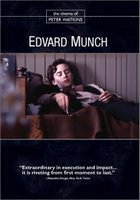Punishment Park (1971), Edvard Munch (1974)
Published Sunday, March 26, 2006 by modium | E-mail this post Punishment Park (1971)
Punishment Park (1971)(Note: I saw Punishment Park 2 months ago and only took a few scant notes, so my impressions are pretty lame.)
I became interested in Punishment Park after seeing it among Eureka's Masters of Cinema line. I haven't seen any of their discs because importing is expensive, but I like the films they've chosen. New Yorker Video has recently released a great edition of Punishment Park in R1, which seems to be on par with Eureka's efforts. I wasn't sure what to expect of the film, and, as I've found, that's the best way to go into almost any film.
The best way I can describe Punishment Park is to say it's Kafka meets The Most Dangerous Game with hippies done in a very effective documentary style. The film is fiction but it is meant to look like a documentary. Unlike most films of this nature, Punishment Park enjoys great success in this aspect. Too many films that make use of this style still manage to feel staged, which not only makes the choice pointless but serves to distract the viewer as well. In Punishment Park, Peter Watkins isn't afraid to let the characters all simply exist, rather than act. The result is a work with breathless realism.
The content of the film is a dystopic mix of fact and fiction in which a number of incarcerated radicals are given a choice between serving the rest of their sentence or competing in 'Punishment Park'. It's designed to be a training exercise for law enforcement officials, but any self-respecting conspiracy nut knows the score. The film is brimming with tension and suspense, laden with foreboding. Watching it, we simply cannot wait to see the conclusion. And, ultimately, the film satisfies our expectations on many levels.
A true masterpiece.

Edvard Munch (1974)
Edvard Munch is not an easy film to discuss. It's closest cinematic relative would be Tarkovsky's Andrei Rublev. But, the connections are scant; both are about artists and their lives, their passion, and both have long runtimes. There are more connections than this, of course, but they are far deeper. In terms of craft, Edvard Munch is nearly impossible to describe. Essentially, it's biographic retelling of Munch's years as a painter. It's loosely chronological in the grand scheme of things, but Watkins frequently intercuts scenes from the past, scenes from Munch's memories, 'interviews' with people in Munch's life.
Watching the film, you get the impression that it's comprised of many layers, both visually and aurally. Like I said, Watkins edits it with bravado with no regard for continuity or space. The film's soundtrack is unique because everything spills out all over everything else. You'll be watching somebody talking, but hear the audio of somebody else speaking in a separate interview, along with the sounds of Munch scratching on his canvas, or the atmospherical details from another scene. It's an entirely unique approach to filmmaking, and I can see it bothering a whole lot of people. But, to me, it proves that there is still a lot of untapped artistic potential in the film medium.
Films about artists are always uniquely fascinating. It's strange when you think about it, using one art form to explore another completely different artform. Here, Watkins uses film brilliantly, not only to inform the viewer, but to try to convey the emotions that Munch feels. It can feel a little bit slow when we're watching members of the Norwegian bohemian scene babble on about this and that, intercut with shots of Munch simply watching, making eyes with various women, but it all serves to clue the viewer into Munch's life and experiences. This makes the scenes where we see Munch creating all the more fascinating. It's amazing to watch, seeing Munch creating something, knowing what's going on in his head, watching how that influences every stroke on the canvas.
It's a certain kind of a masterpiece, but nonetheless, an undeniable masterpiece. It's films like Edvard Munch that show the unique elements that cinema can offer that cannot be duplicated in any other artform.
Next Tuesday, New Yorker Video continues with it's series of Peter Watkins DVDs with his 1969 film, The Gladiators. They've done a great job with their first two discs, so I'm sure The Gladiators will be a great film and a great DVD. Kudos to them, and I can only hope that more of Watkins' work comes out soon.
0 Comments:
modium
- Rhode Island, United States
- My profile
Links
Other Nerds
Previous posts
Archives
- 2005-06-26
- 2005-07-03
- 2005-07-10
- 2005-07-17
- 2005-07-24
- 2005-07-31
- 2005-08-07
- 2005-08-14
- 2005-08-21
- 2005-08-28
- 2005-09-04
- 2005-09-11
- 2005-09-18
- 2005-09-25
- 2005-10-02
- 2005-10-09
- 2005-10-16
- 2005-10-23
- 2005-11-06
- 2005-11-27
- 2006-01-29
- 2006-03-26
- 2006-04-02
- 2006-04-09
- 2006-04-30
- 2006-05-07
- 2006-05-28
- 2006-06-25
- 2006-07-09
- 2006-07-23
- 2006-08-06
- 2006-08-27
- 2006-09-03
- 2006-09-10
- 2006-09-17
- 2006-10-08
- 2006-11-19
- 2006-11-26
- 2006-12-03
- 2007-02-25
- 2007-06-17
- 2008-05-11
- 2008-05-25
- 2008-06-01
- 2008-06-22

